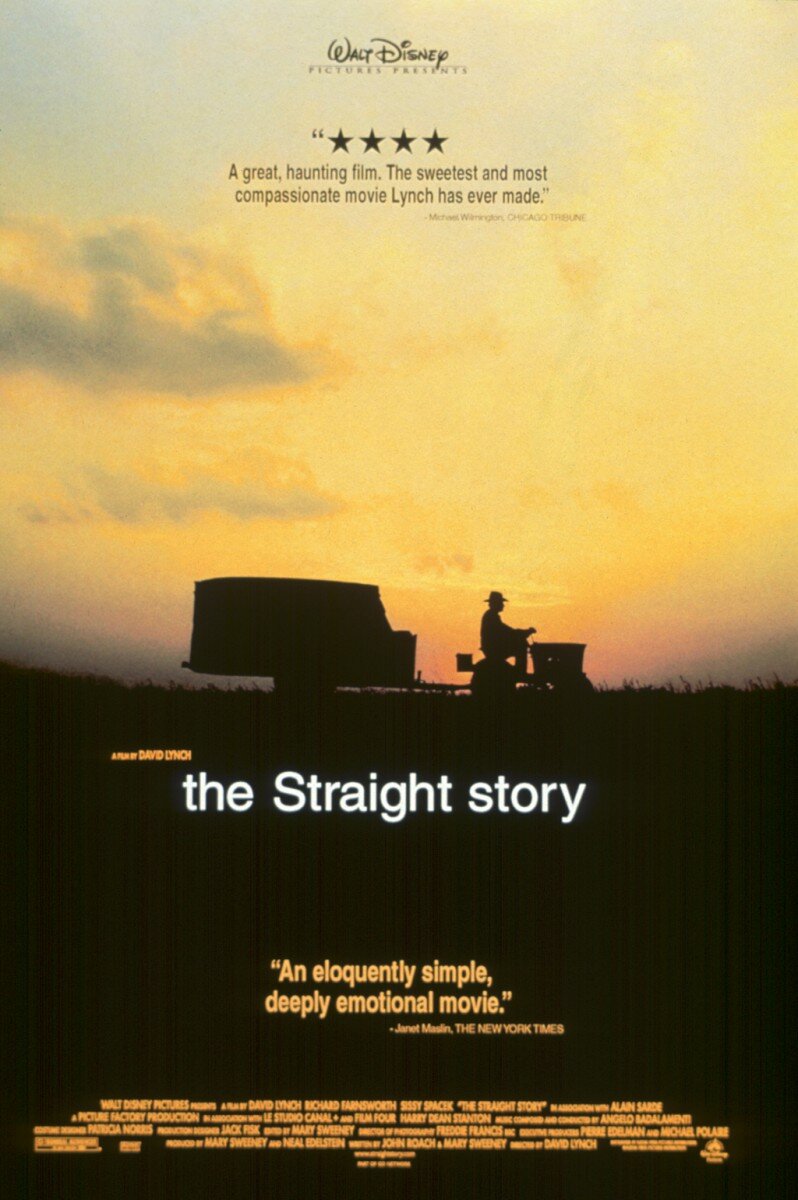Summary:
An elderly man decides to drive across several states on a lawnmower to see his estranged brother who has just had a stroke.
My Thoughts:
When I set out to watch “The Straight Story”, I had no idea that it would become one of my favorite David Lynch films, in fact, I had expected to be rather tepid towards it. Though I love David Lynch, this film is about as far away from experimental Lynch as you can get, and when I watch Lynch, I usually want weird experimental stuff (like doppelgangers, cyclical storytelling, and personifications of death).
This film has none of that experimental stuff; it is, as the title implies, just a straight story, but it does have a few moments where characters behave in ways that I would consider very Lynchian. What makes this film great is not just Lynch’s direction, but the wonderful writing, which contains so many simple but important lessons an elderly man imparts on the people he meets upon his journey, from young college kids to war vets with stories similar to his. This is an incredibly simple but powerful tale, one that still touches on the existential themes around which Lynch has crafted a career.
This is one of the best road trip movies I’ve ever seen, right up there with “Wild Strawberries” and “Y Tu Mama Tambien”.
“The worst part of being old is rememberin’ when you was young.”
Alvin Straight (Richard Farnsworth, “Misery”) is an elderly man who sees the end of his life coming fast. He lives with his somewhat mentally challenged daughter Rose (Sissy Spacek, “Badlands”), but his wife had passed away years ago. After he finds out that his estranged brother (Harry Dean Stanton, “Paris, Texas”) had a stroke, he decides to drive his lawnmower 240 miles to see him and patch up the relationship.
I think the thing I like most about this movie is the sheer simplicity of it, and the way that simplicity starts to take on multiple meanings, so that this story is not just about a man going to visit his brother, but also about a man revisiting the past events of his life . Many of the shots in this movie can be taken metaphorically; the road starts to represent the path of life that we all must travel; the use of water and storms comes to represent the pervasive presence of death; the background characters are those we interact with as we pass through life- be they friends, acquaintances, or just people who we may meet for a quick drink and never see again. This is a movie that loves life and everything in it, but it’s also a movie that understands the temporariness of it all, and in my opinion, knowing that something doesn’t last gives the moments we have more valuable; this film seems to share that same opinion.
Beyond the simplicity and universality of the themes, this movie is amazingly directed. I mentioned before that this is the least Lynchian movie I’ve seen from Lynch, but he still does find ways to infuse his peculiar sense of humor into this story. One of the first scenes, for example, shows Alvin fall down in the kitchen, and four people come into the kitchen asking why he’s lying on the ground instead of trying to help him to his feet. It’s totally bizarre and absolutely hilarious at the same time. There are other moments that don’t necessarily feel experimental, but the way that they touch on existential themes made me thing of scenes from “Inland Empire” or “Mulholland Drive”. I loved, for example, the scene after Alvin comes back from the doctor and doesn’t tell his daughter that he’s sick, and that night, as they watch a storm come in, you can just feel Alvin’s dread; he knows death is coming and there’s nothing he can do to stop it. Then, later on, when Alvin is driving in the rain and pulls over to park in a barn, we see the way that he has made peace with the weather, almost as if he has come to terms with the fact that the weather, just like death, is something that can’t be avoided, and from the way he smiles and lights a cigar, we can sort of see that he has made peace with that fact of life.
I loved Farnsworth as Alvin. I thought he was absolutely charming and endearing, and the stubbornness of his character, his determination to complete his goal, made him all the more compelling. The only part that I did not like about this film was Sissy Spacek, and I feel absolutely horrible saying that because she’s one of my favorite actors. In this film, however, Sissy plays a slightly mentally handicapped person, and the way that she portrays that person is sometimes cringeworthy. It’s not offensively bad; it just is enough to make me wish she’d have toned it back a bit.
Verdict:
I’m surprised to say that this is my fourth favorite Lynch movie (behind “Mulholland Drive”, “Eraserhead”, and “Inland Empire”). This is a wonderfully powerful movie, one that I think almost everyone could enjoy.
End Note: Though this film is rated “G”, the themes pretty heavy, and there’s one scene where two vets recount their war stories that feels about as intense as Quint’s ‘sharks in the water’ story in “Jaws”. I wouldn’t at all be surprised if this would earn a “PG-13” if it were to come out today.
Review Written By:






